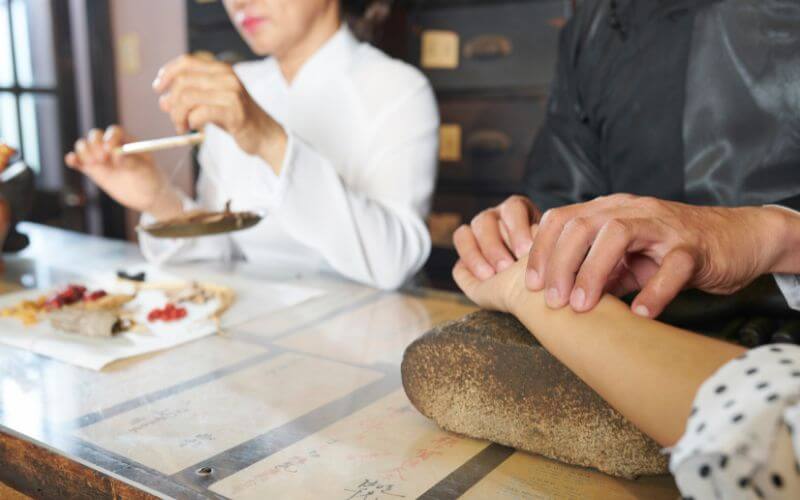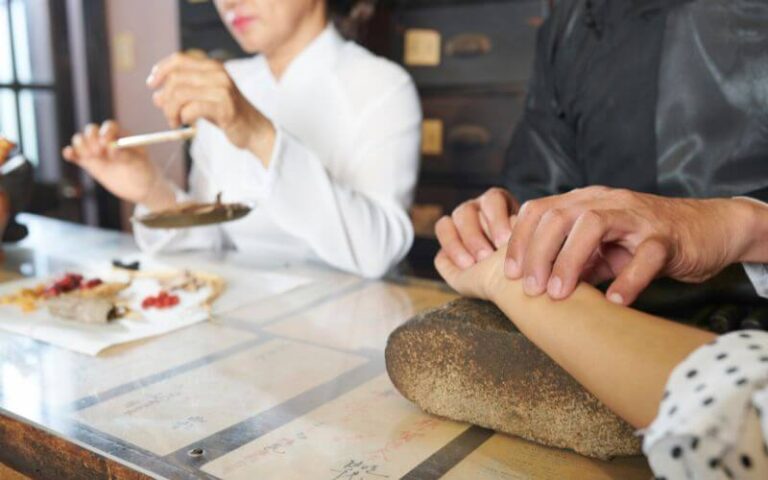In recent years, there has been a growing interest in traditional Chinese medicine (TCM) and the role of Chinese TCM practitioners in healthcare.
With its roots dating back thousands of years, TCM encompasses a holistic approach to health and wellness that focuses on balancing the body’s energy, known as Qi.
Chinese TCM practitioners play a crucial role in diagnosing and treating various ailments using herbal medicine, acupuncture, dietary supplements, and other traditional techniques.
As we look ahead to the year 2024, it’s important to understand the evolving landscape of healthcare and the increasing integration of TCM with Western medicine.
The function of Chinese traditional medicine (TCM) practitioners in contemporary healthcare settings, their contributions to patient care, and the difficulties they encounter in being accepted by mainstream medicine will all be covered in this article.
Exploring the Role of Chinese TCM Practitioners

Chinese TCM practitioners, also known as traditional Chinese medicine doctors or oriental medicine practitioners, are trained in the principles of TCM, which is based on the concept of qi, or vital energy, flowing through the body.
According to TCM theory, imbalances in the flow of qi can lead to illness and disease.
By using techniques such as acupuncture, herbal medicine, and dietary therapy, Chinese TCM practitioners aim to restore harmony and balance within the body.
Rising Demand
In recent years, there has been a growing interest in complementary and alternative medicine (CAM) practices, including Traditional Chinese Medicine.
Many patients are seeking out TCM practitioners for treatment of various conditions that may not respond well to conventional medicines.
Conditions such as carpal tunnel syndrome, the common cold, and chronic pain are just a few examples of ailments that Traditional Chinese Medicine practitioners may be able to help with.
Personalized Holistic Care
Giving each patient individualized treatment is one of the main responsibilities of Traditional Chinese Medicine practitioners.
Unlike Western medicine, which often focuses on treating symptoms, TCM takes a more holistic approach by considering the patient’s overall health and well-being.
Chinese TCM practitioners spend time getting to know their patients’ medical history, lifestyle habits, and emotional state in order to develop a treatment plan that addresses the root cause of their health issues.
Proactive Wellness Advocates
In addition to providing individualized care, Chinese TCM practitioners also play a valuable role in promoting preventive healthcare.
By identifying imbalances in the body before they manifest as symptoms, TCM practitioners can help patients maintain optimal health and prevent the onset of chronic diseases.
This proactive approach to healthcare aligns with the growing emphasis on preventive medicine in modern healthcare settings.
Collaborative Healthcare: Integrating TCM with Western Medicine

Furthermore, Chinese TCM practitioners often work in collaboration with other healthcare professionals, including Western medical doctors, to provide comprehensive care for their patients.
This integrative approach allows for the best of both worlds, combining the strengths of Western medicine with the holistic principles of TCM.
In fact, many hospitals and medical centers now offer integrated healthcare services that include TCM therapies alongside conventional treatments.
Overcoming Hurdles: The Recognition of Chinese TCM Practitioners in Mainstream Healthcare
Despite the benefits of TCM and the valuable role of Chinese TCM practitioners in healthcare, they still face challenges in gaining recognition and acceptance within mainstream medical practices.
One of the main obstacles is the lack of standardized training and regulations for Chinese TCM practitioners.
While there are certification programs and licensing requirements in place, the standards can vary widely from state to state and country to country.
This inconsistency can lead to skepticism and mistrust among healthcare professionals who may not fully understand the principles of TCM.
Evidence-Based Validation: Bridging the Gap for TCM Practices in Mainstream Medicine
Another challenge is the limited research and evidence-based studies on the efficacy of TCM treatments.
While there is a growing body of research on acupuncture and herbal medicine, more studies are needed to validate the effectiveness of these therapies in treating specific conditions.
Without solid scientific evidence, it can be difficult for Chinese TCM practitioners to gain acceptance in mainstream medical settings.
Breaking Barriers: Advancing Traditional Chinese Medicine Practitioners in Mainstream Healthcare
Traditional Chinese Medicine (TCM) practitioners are breaking barriers and advancing into mainstream healthcare systems.
As more people are seeking alternative and holistic healthcare options, TCM practitioners are becoming recognized for their unique approach to healing.
One way Chinese medicine doctors are making strides in mainstream healthcare is by collaborating with Western medical professionals.
By working together, they can offer patients a well-rounded approach to health and wellness that combines the best of both worlds.
Additionally, TCM practitioners are educating the public and healthcare professionals about the benefits of traditional Chinese medicine.
Through workshops, seminars, and community outreach programs, they are increasing awareness and acceptance of TCM in the healthcare industry.
As more research is conducted on the efficacy of TCM practices, such as acupuncture, herbal medicine, and qigong, mainstream healthcare providers are beginning to integrate these modalities into their treatment plans.
This integration is helping to provide patients with more comprehensive and personalized care.
Qualifications and Training for Chinese TCM Practitioners

Becoming a Chinese TCM practitioner requires specialized training and education in traditional medicine practices.
To practice as a qualified practitioner, individuals must complete a rigorous program of study that includes both theoretical knowledge and practical skills.
Journey to Becoming a TCM Practitioner
Most practitioners begin their education by obtaining a bachelor’s degree in Traditional Chinese Medicine from an accredited institution.
The curriculum typically includes courses in acupuncture, herbal medicine, nutrition, and anatomy.
In addition to classroom instruction, students also receive hands-on clinical training to develop their skills in diagnosing and treating patients using TCM therapies.
Path to Becoming a Licensed Traditional Chinese Medicine Practitioner
After completing their degree program, aspiring TCM practitioners must pass a licensing examination to become certified to practice.
Some states may require additional certifications or licenses for specific practices, such as acupuncture or herbal medicine.
Once licensed, TCM practitioners can choose to work in a variety of settings, including private practices, hospitals, wellness centers, and integrative healthcare clinics.
Begin Your Wellness Journey with Lau Of Natural Healing TCM

If you are looking for comprehensive and holistic healthcare options, starting your wellness journey with Lau Of Natural Healing TCM is a great choice.
With a wide range of wellness classes offered, individuals can explore the ancient practices of Acupressure, Tai Chi, Qigong, Yoga, Pilates, and more to enhance their physical, mental, and emotional well-being.
These classes are designed to help individuals tap into their body’s natural healing abilities by promoting the flow of Qi (energy) throughout the body.
Through gentle movements, breathwork, and mindfulness practices, participants can experience relief from chronic pain, stress reduction, improved flexibility and strength, enhanced mental clarity, and overall vitality.
By incorporating these ancient healing modalities into your daily routine, you can support your body’s internal organs, improve circulation, and boost your immune system.
Whether you are dealing with chronic pain, stress-related illnesses, or simply looking to enhance your overall well-being, TCM practices can offer valuable tools for self-healing and empowerment.
By participating in wellness classes at Lau Of Natural Healing TCM, you will have the opportunity to learn from a qualified practitioner who has a deep understanding of Traditional Chinese Medicine.
Get in touch with us today and start your journey towards optimal health and wellness.
Conclusion
In conclusion, Chinese TCM practitioners play a vital role in promoting health and well-being through traditional Chinese medicine therapies.
By combining ancient healing practices with modern medical knowledge, they offer patients a comprehensive approach to healthcare that addresses both the symptoms and underlying causes of illness.
As the demand for integrative medicine continues to grow, Chinese TCM practitioners will have even more opportunities to collaborate with conventional healthcare providers and expand their practice.
To thrive in 2024 and beyond, Traditional Chinese medicine practitioners must continue advocating for standardized training and regulation within the field, as well as conducting research to validate the efficacy of T CM treatments.








